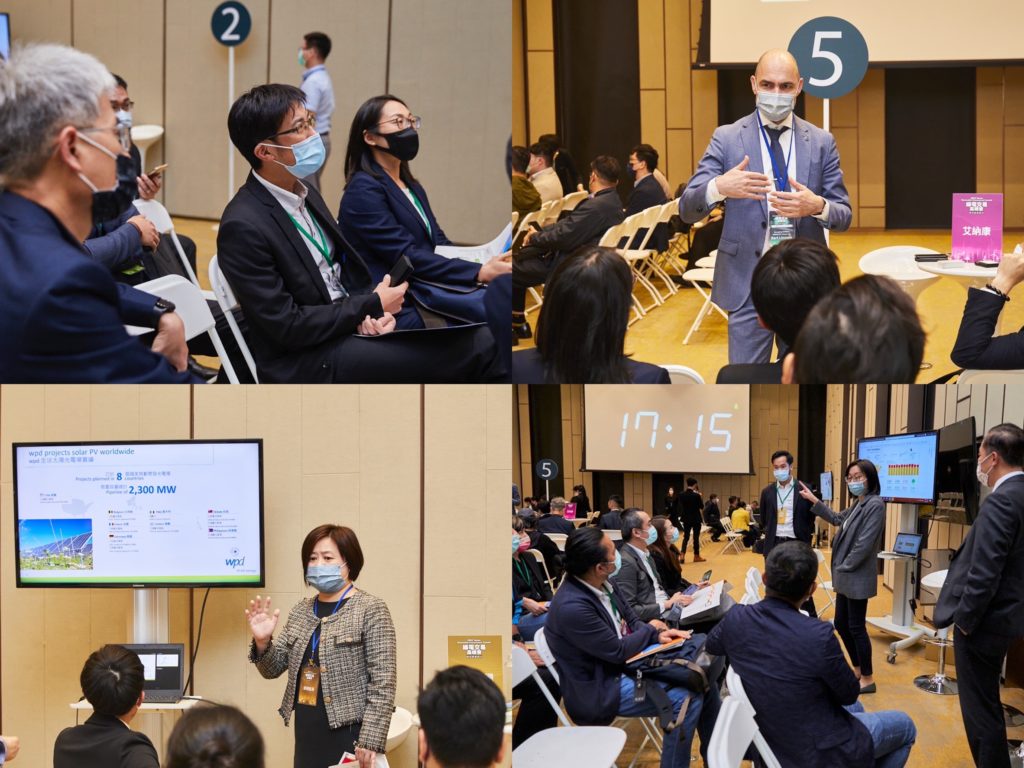[Event Report] 2022 Taiwan Renewable Procurement Summit 臺灣首屆綠電交易高峰會
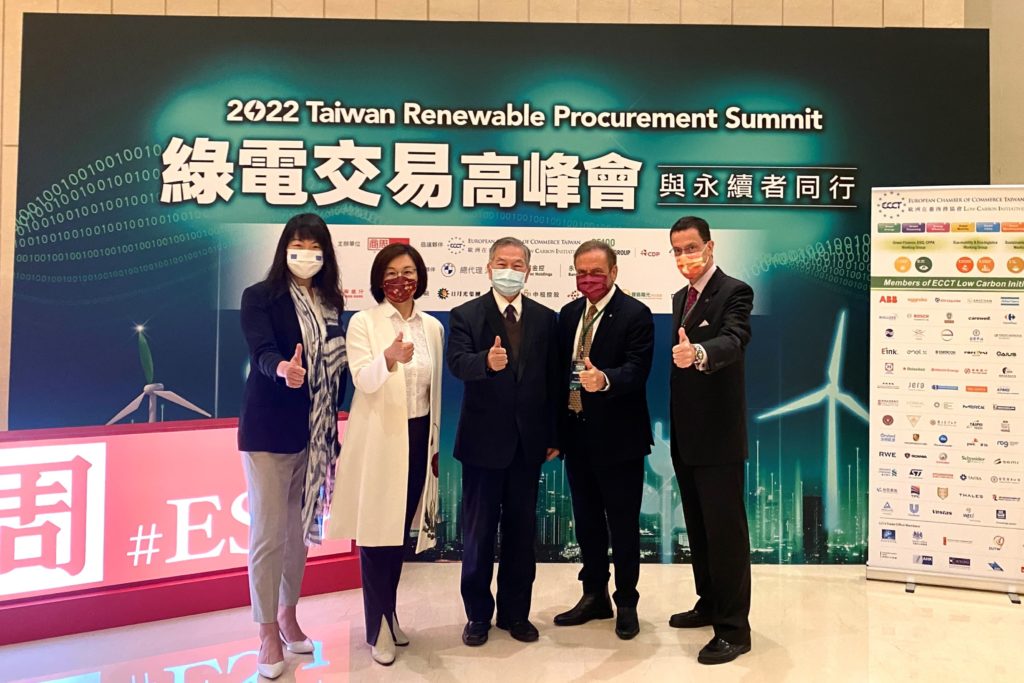
(L-R) Sammy Su, Director of ECCT LCI, Kuo Yi-ling, CEO of Business Weekly Group, Shen Jong-chin, Vice Premier of EY, Giuseppe Izzo, Chair of ECCT LCI, Freddie Hoeglund, CEO of ECCT
- Photo Gallery: Facebook
- Press Coverage: PDF
- Event Highlight Video: https://reurl.cc/ErvxMR
The 2022 Taiwan Renewable Procurement Summit was arranged by Business Weekly magazine in partnership with the ECCT’s Low Carbon Initiative and RE100. The full-day event was held in a hybrid format to bring together experts to share best practices and strategies to meet renewable procurement demands. This follows Taiwan’s announcement on 30 March of a Net Zero Roadmap by 2050, and on 22 April of the Climate Change Response Act, which includes Taiwan's carbon fee mechanism, which sets carbon levies for emission sources. At the event, experts from Europe and Taiwan shared insights on barriers and opportunities in renewable sourcing, policies and case studies of supplying fair price renewable energy to SMEs. Tseng Wen-sheng, Deputy Minister of the Ministry of Economic Affairs (MOEA) and ECCT Vice Chairman Giuseppe Izzo made opening remarks in the first session while Vice Premier Vice Premier Shen Jong-chin made opening remarks in the second session.

Kuo Yi-ling, CEO of Business Weekly Group 商業周刊執行長 郭奕伶

Giuseppe Izzo, Chair of ECCT LCI 歐洲商會-低碳倡議行動主席 尹容
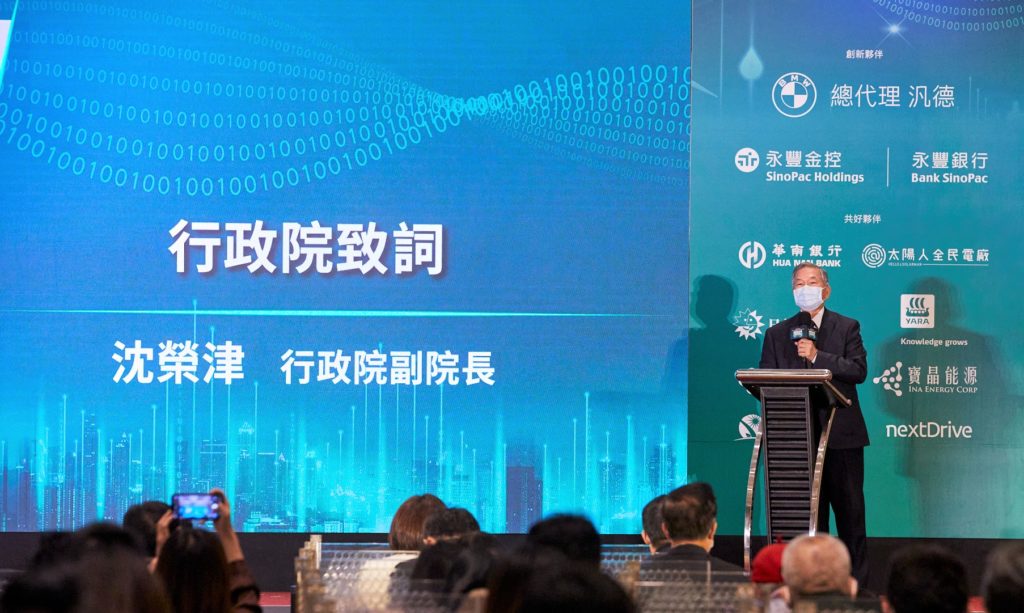
Shen Jong-chin, Vice Premier of Executive Yuan 行政院副院長 沈榮津
Session 1 – Global trends of renewable energy transactions
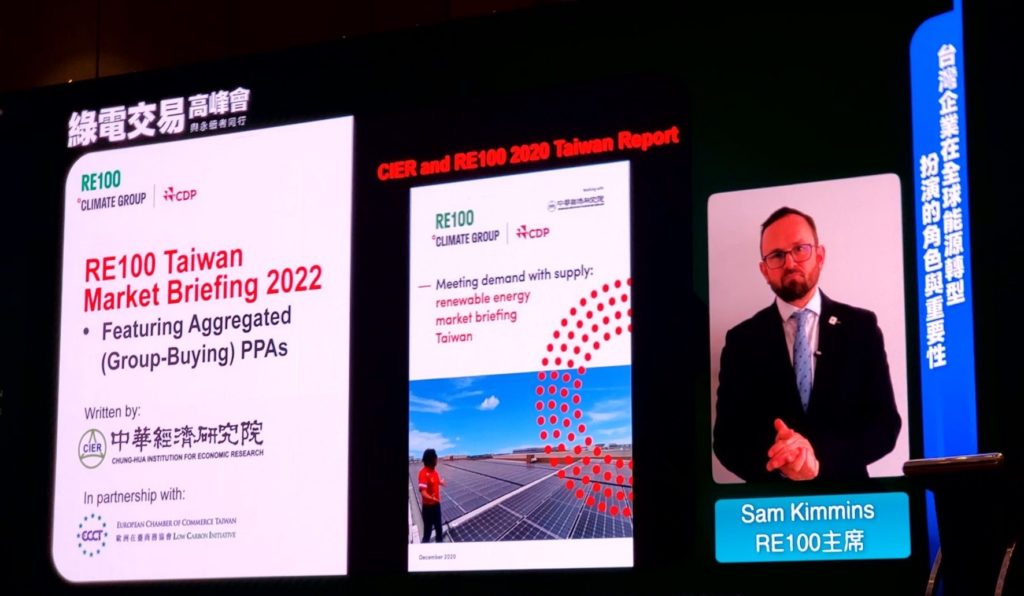 Sam Kimmins, Head of RE100
Sam Kimmins, Head of RE100
In pre-recorded remarks, Sam Kimmins, Head of RE100, gave a short introduction to RE100. He reported that RE100 now has 360 members globally that are committed to getting 100% of their energy from renewables. 62% of members are headquartered in the Asia Pacific region, including 16 members from Taiwan. TSMC was the first semiconductor company to join RE100. It was also the first to sign a corporate power purchase agreement (CPPA) for offshore wind energy. Acer, ASUS, Delta, UMC, AUO and Merry Electronics are other large tech companies that have signed up. In Taiwan, RE100 has partnered with the Chung-Hua Institution for Economic Research (CIER) to provide advice and produce reports, including the RE100 2022 report. He said that policy makers are listening and taking action, including the Taiwan government, which has raised its renewable energy target.
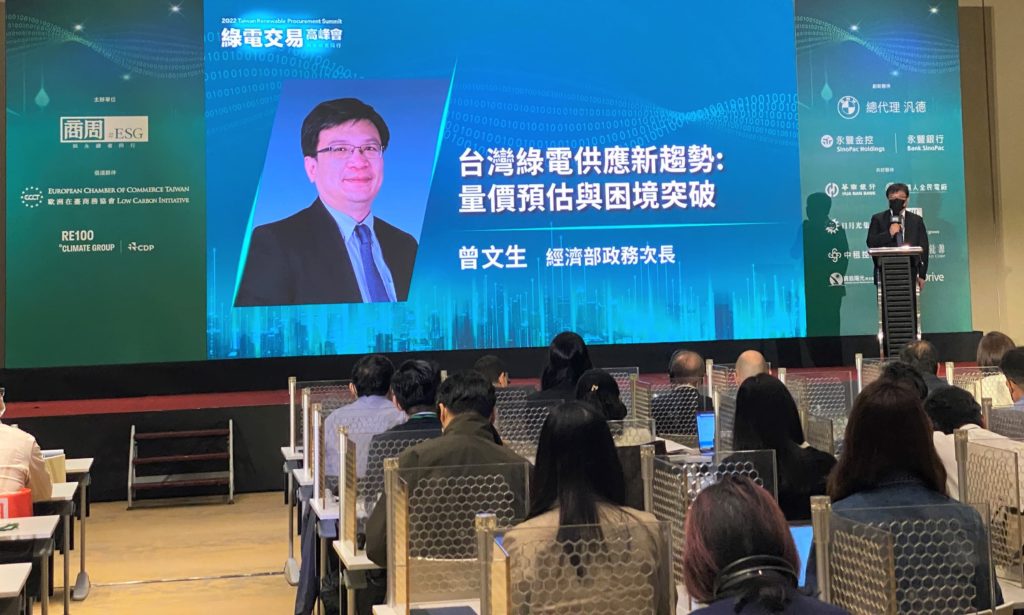
Tseng Wen-sheng, Deputy Minister of MOEA 經濟部次長 曾文生
In his remarks, MOEA Deputy Minister Tseng Wen-sheng spoke about the developing trends in renewable supply, volume, price and breakthroughs amid growing demand for green energy in Taiwan. He spoke about the ministry's plans to assign part of all green power generated in Taiwan to a retail market for small and medium-sized enterprises (SMEs). According to the minister, the MOEA will require both solar energy and offshore wind power producers to reserve a certain amount of their energy production for use by the retail market.

Giles Dickson, CEO of WindEurope
In pre-recorded remarks Giles Dickson, CEO of WindEurope, spoke about renewable procurements strategies in Europe. While there are many models for facilitating renewables, the wind energy focus is on long-term corporate PPAs. About 10% of new wind farms were supported by PPAs in 2021.
He introduced the Renewable Energy Buyers Toolkit. It is an open-source tool, which provides critical information, especially for new players to help them enter the European market for corporate sourcing of renewable electricity. The tools in the kit are designed to help unlock the huge potential for corporate sourcing and make a real decarbonisation impact. Tools include a model contract, guidance on how companies can engage with wind or solar operators and developers and how they can aggregate as a group. Buyers benefit by locking in the price of energy at affordable levels for long periods while producers can secure more predictable revenues.
He noted that there has been a huge increase in PPA volume in Europe. Over 6GW of volume was added last year. Broken down by country, Spain has had the most PPAs over the past two years, and has overtaken Sweden, Norway and Germany in terms of volume. Two thirds of the volume in Europe is for wind energy. He added that there is considerable diversification of buyers and procurement models. The leading sector is ICT and the leading buyers are Amazon and Google, followed by aluminium manufacturers.
He went on to list the key enablers of PPAs: a good pipeline of projects is important and generators need to be able to sign bilateral contracts. Traceability is important, which is why energy certificates and certificates of origin are needed. Credit support is also crucial while underwriting is important for developers. Dickson noted that some large European companies are skipping PPAs and investing in their own wind farms. He listed BASF as an example, which has invested in offshore wind farms.
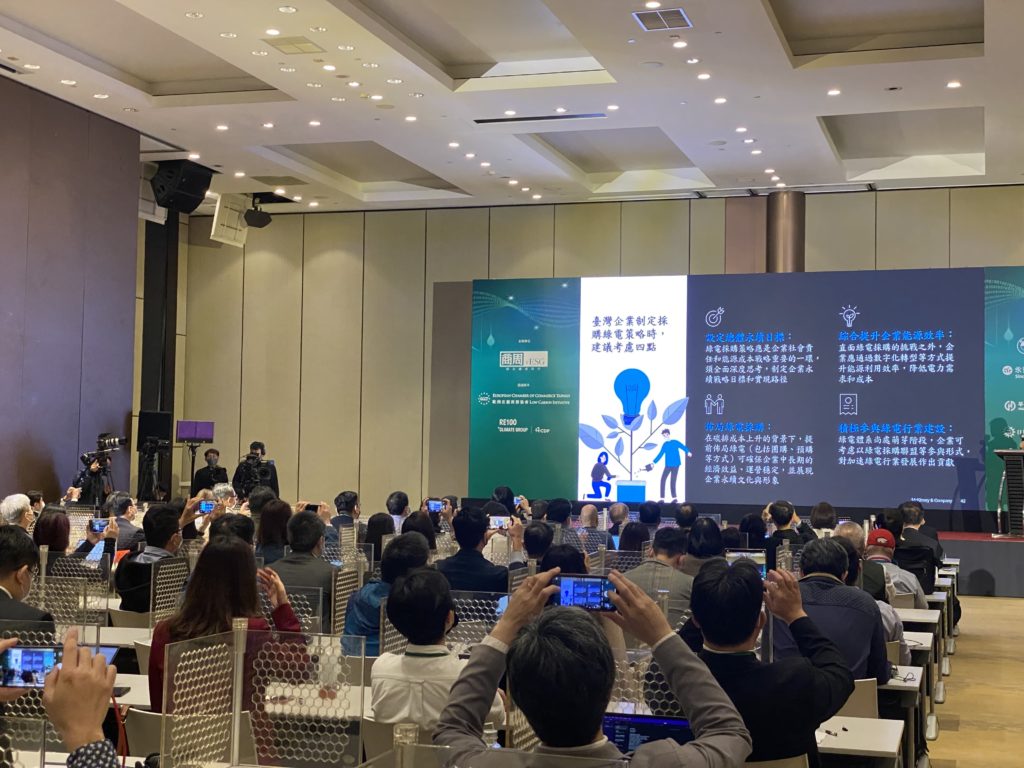
Denise Lee, Partner from McKinsey Taiwan, spoke about the global renewable energy boom. She noted that the change in the global energy mix is accelerating towards electricity from renewables and hydrogen. It is estimated that 80-90% of the world's electricity supply will come from renewables by 2050. While global energy consumption is still growing, the future trajectory will depend on a number of factors, including energy efficiency and the commitment to replacing fossil fuels with renewables. It will also depend on how the falling costs of renewables. In late 2020 the marginal costs of renewables could compete with fossil fuels in most countries. She went on to outline the energy situation in China, Japan. Mainland China plans to accelerate investment in renewable energy and its green electricity market continues to grow while Japan will vigorously develop offshore wind power and hydrogen energy to achieve carbon neutrality goals. Meanwhile regulators across the globe are actively promoting the green transformation of industries. Citing her survey of views of various stakeholders shows that companies are willing to pay a premium for green energy. Google's strategy, for example, began with carbon offsets but the company gradually became ever more aggressive in switching to renewable energy. By 2017, the company had procured sufficient renewable energy to match total demand of its operations. She concluded that green electricity procurement has different challenges in different markets, and enterprises need to consider suitable solutions according to local conditions.
Session 2 – Challenges and strategies for renewable procurement

Tsai Yi-tai, , Partner of PwC Taiwan & Leader of LCI Green Finance, ESG and CPPA working group 資誠會計事務所主持會計師暨 LCI 綠電工作小組召集人 蔡亦臺
In his presentation Tsai Yi-tai, (蔡亦臺), Partner of PwC Taiwan, also the Leader of LCI Green Finance, ESG and CPPA working group began with an overview of Taiwan's green energy market, noting that Taiwan's renewable energy power generation exceeded 17.4 billion kWh in 2021 but that private renewable energy power plants only accounted for 15.5% of that. She reiterated a view expressed by the BSMI that the wholesale price of green energy will decline year by year and that green energy transaction volume will grow rapidly. She went on to describe some possible problems in green electricity transactions and how to address them.
In his presentation Chuang Ming-fu (莊銘福), General Manager of Bank Sinopac, spoke on the topic "Green finance challenges and transformational innovation".
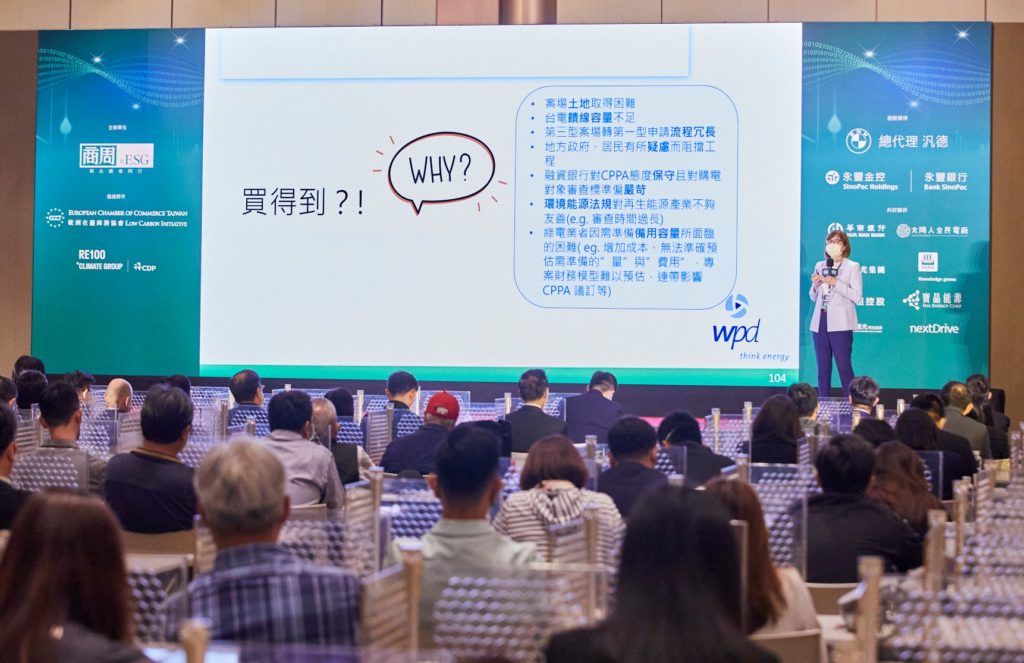
Yuni Wang, Chairman of wpd 達德能源董事長 王雲怡
In her presentation Yuni Wang (王雲怡), Chairperson of wpd Taiwan, spoke about the challenges and opportunities for enterprises of direct purchasing of renewable energy. Although 2020 was the first year to see green energy power transfer transactions, things have been moving slowly owing to a range of problems, including the difficulty in getting land, insufficient grid capacity, complicated permitting procedures, and the difficulty in getting financing, among others. Said that she hoped that the government can carry out reforms to increase the convenience of buying at a reasonable price. In addition to permitting issues, getting the support of community stakeholders is also very important. Many projects, for example, are held up by concerns that the noise from wind turbines are harmful to humans. However, no research conducted in countries like Germany, Sweden and Australia have ever shown any physical harm caused by turbines. Moreover, at a distance of 200 metres from a turbine, you will not be able to hear any sound from turbines. There are also problems with Environmental Impact Assessments (EIAs) and the time it takes to get approvals. Another problem is energy storage. Regarding fair pricing, Taiwan has got used to overly cheap electricity. As to what can be done, the speaker said that the government could simplify the review process and follow scientific standards for things like noise levels. She made the point that increasing the capacity of renewables is not just important to reduce carbon emissions but is also crucial if Taiwan is to transition to electric vehicles, which will require a lot more green electricity.
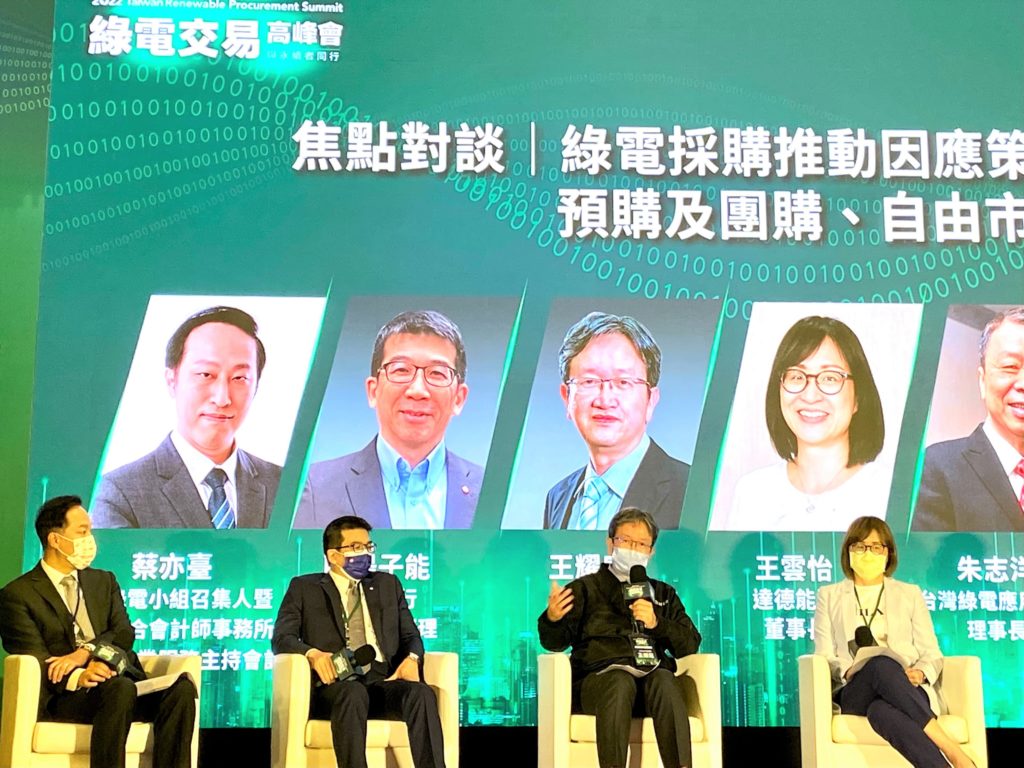
Wang Yao-ting, President of Taipower (R2) 臺電總經理 王耀庭
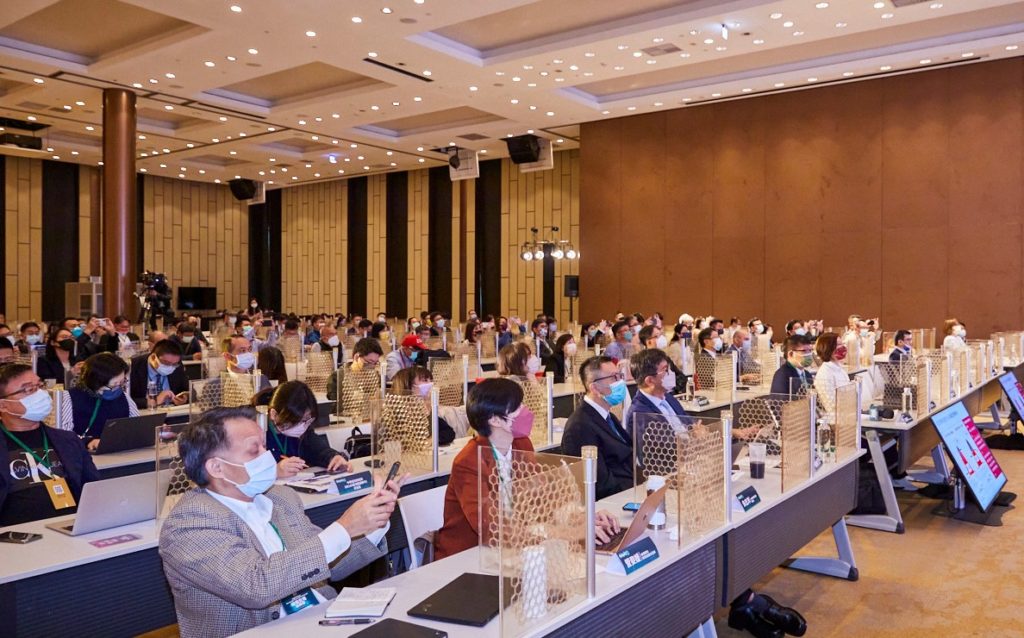
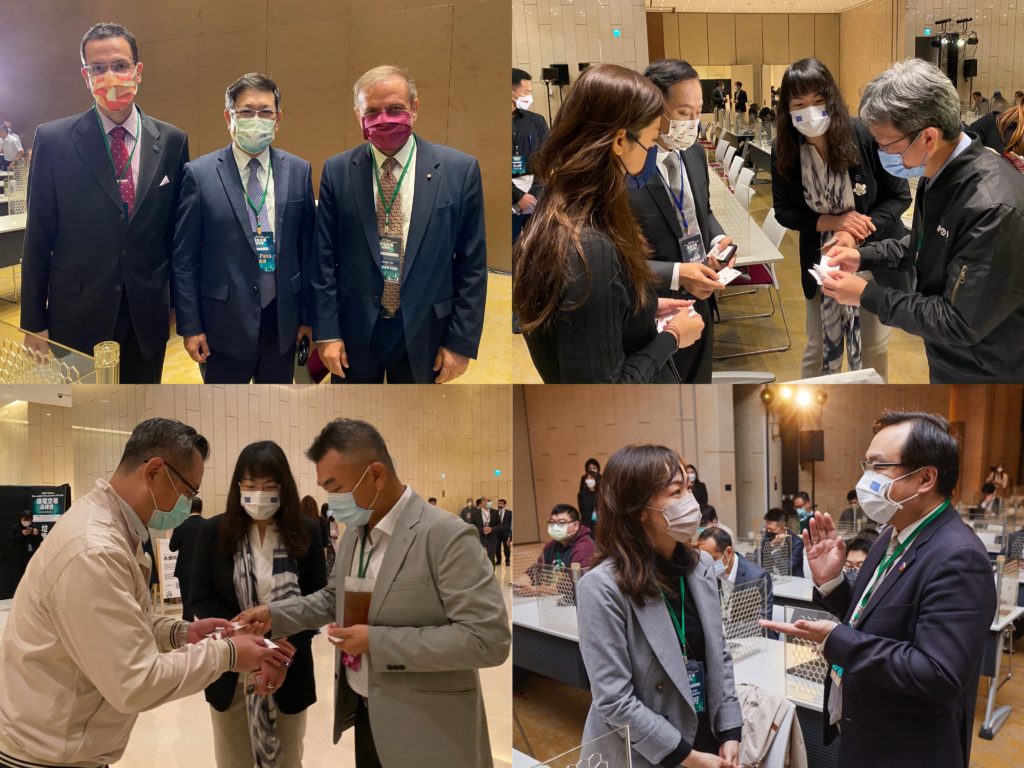
Session 3 – Renewable procurement mechanisms
In his presentation, Hsieh Han-chang (謝翰璋), Deputy Director General from the MOEA's Bureau of Standards Metrology and Inspections (BSMI) spoke about the status and prospects for the green electricity trading market. To promote the country's renewable energy development, the National Renewable Energy Certification Center was established in 2017 for green power transactions. Since issuing its first certificate in May 2017, the centre has issued 1.26 million certificates to green power producers in Taiwan, enabling them to trade their power on a green energy transaction mechanism inaugurated in 2020, or retain the electricity for self-use. The 1.26 million certificates were issued for the production of 1.26 billion kilowatt hours of electricity via renewable sources.

Hsieh Han-chang, Deputy Director-General of BSMI 標檢局副局長 謝翰璋
For its part, in order to assist buyers and sellers to match their needs the BSMI established a green electricity trading platform in 2020 and completed the first batch of transfer transactions in May of that year. However, many users have complained that they faced problems buying renewable energy.
The biggest problem is that large players have bought up all the capacity. In particular, of the 1.06 million certificates issued by the centre as of mid-February, about 910,000 certificates have been traded on the transaction platform with TSMC purchasing almost 900,000 certificates. For this reason, there is a plan to rent solar photovoltaic projects on public land, and enter a certain proportion of the installation capacity into the trading market, for which SMEs will be given priority. There are also other difficulties in using the platform, which the BSMI plans to address. The speaker also said that due to low wholesale prices in the auction mode of the next phase of offshore wind energy development, there will be an opportunity to provide the market with a large amount of renewable energy at affordable prices.
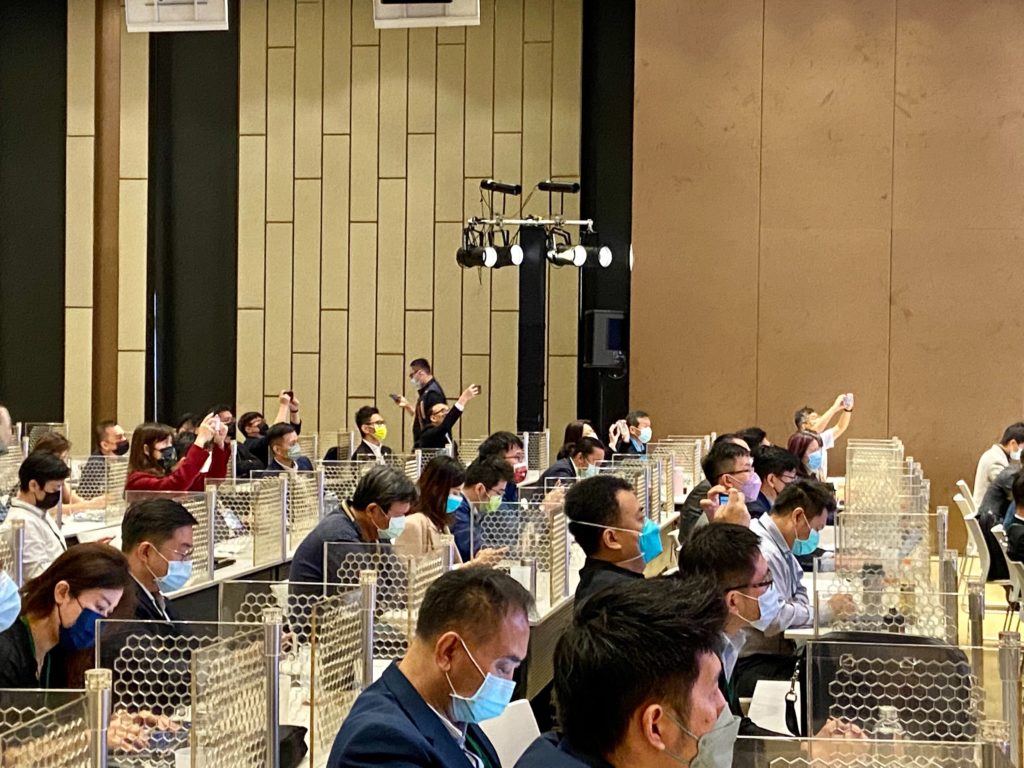
In his presentation, Chou Zhi-hong (周志宏), Chief Sustainability Officer from Delta spoke about opportunities and challenges of renewable energy in manufacturing, based on his company's experience.
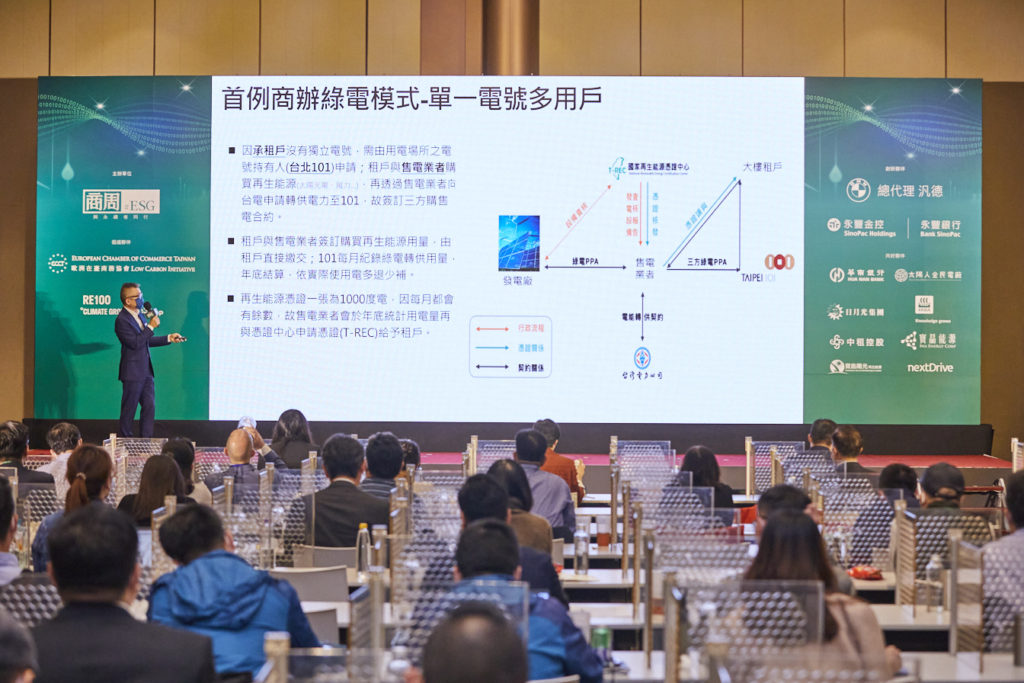
Michael Liu, Vice President & Chief Operation Officer of Taipei 101 台北101營運長 劉家豪
In his presentation Michael Liu (劉家豪), Vice President & Chief Operation Officer from Taipei 101 spoke on the topic: "A new model for green offices – Renewables transference".
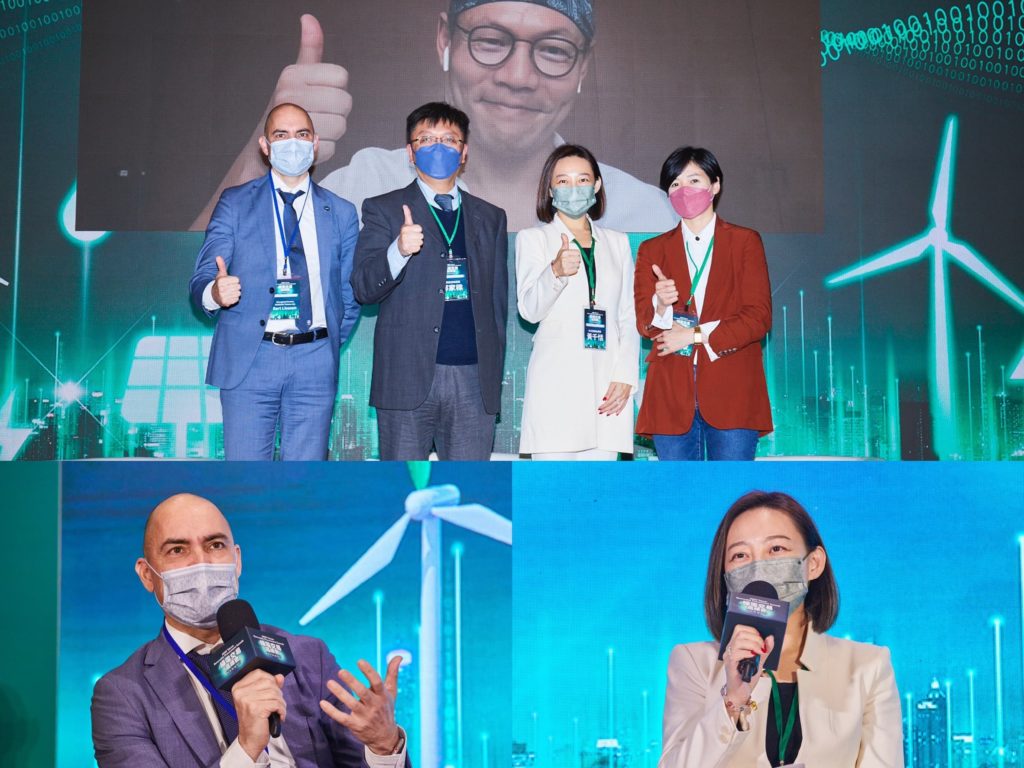
(L-R) Bart Linssen, Managing Director of ENERCON, Mandy Huang, Spokesperson & Chief Sustainability Officer (左至右) 艾納康董事總經理 黎森、大江生醫發言人暨永續長 黃千恬
Bart Linssen, Managing Director of Enercon Taiwan participated in the final panel discussion together with the speakers from the session and gave a presentation about Enercon's new turbine technology. In his presentation, he reported that 233 Enercon turbines in Taiwan have remained operating for more than 20 years without incident despite numerous typhoons and earthquakes. On the issue of noise, he noted that the noise level 100 metres away from a turbine is 50 decibels, which is the equivalent noise of an air conditioner or a refrigerator. The great advantage of onshore wind turbines is that they take up much less space than solar panels. It also takes just five days to install an onshore turbine. They also provide the cheapest form of green electricity available now. He noted that The Netherlands, even though it is a small, densely populated country like Taiwan, has much more onshore wind energy capacity installed than Taiwan by making use of areas along highways, in harbours and industrial areas. He concluded with his favourite slide showing how Heineken is using onshore wind to power its beer-making operations.
Concluding remarks were made by Lu, Kuo-Chen (呂國禎), Chief Editorial Writer form Business Weekly Group.
After the summit, over 80 stakeholders interested in renewable sourcing attended a 1.5 hour matchmaking session.
